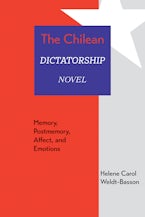- Home
- literary criticism
- Postmodernism of Resistance in Roberto Bolaño’s Fiction and Poetry
Postmodernism of Resistance in Roberto Bolaño’s Fiction and Poetry
Published by: University of New Mexico Press
474 Pages, 6.00 x 9.00 in
Postmodernism of Resistance in Roberto Bolaño's Fiction and Poetry examines the ways in which Bolaño employs a type of literary aesthetics that subverts traits traditionally associated with postmodernism. Pastén B. coins these aesthetics "postmodernism of resistance" and argues that this resistance stands in direct opposition to critical discourses that construe the presence of hopeless characters and marginal settings in Bolaño's works as signs of the writer's disillusionment with the political as a consequence of the defeat of the Left in Latin America. Rather, he contends, Bolaño creates a fictional world comprised of characters and situations that paradoxically refuse to accept defeat--even while displaying the scars of terrible historical events. In this work Pastén B. challenges some critical assumptions about Bolaño's fiction and poetry that led to decontextualized interpretations of his work and offers a singularly comprehensive investigation that synthesizes multiple perspectives of a complicated author into one text.
J. Agustín Pastén B. is a professor in the Department of Foreign Languages and Literatures at North Carolina State University. He is the author of Octavio Paz: crítico practicante en busca de una poética.
"Postmodernism of Resistance in Roberto Bolaño's Fiction and Poetry sets a new standard for Bolaño scholarship. Pastén B. has an extraordinary command of the entirety of Bolaño's literary output, of the different contexts informing his work, and of the huge body of scholarship that has arisen around it. It is truly a pleasure to read the work of so well informed a critic."--Maarten van Delden, author of Carlos Fuentes, Mexico, and Modernity
Acknowledgments
Chapter One. Introduction and Theoretical Background
Chapter Two. An Engaged Postmodern Poet's Three-pronged Line of Defense
Chapter Three. The Detective Genre: A Hero with Multiple Faces
Chapter Four: History, Nomadic Gatherings, and Territory in Bolaño's Short Stories
Chapter Five. The Republic of Letters' Trials and Tribulations
Chapter Six. Literature and Disenchantment
Chapter Seven. 2666: Historical Hauntings and Capitalism's Dark Side
Conclusion
Notes
Books by Roberto Bolaño (1953-2003)
Works Cited
Index










